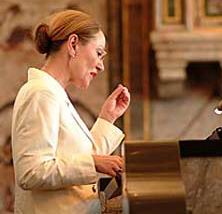EU High Representative for the CFSP
November 29, 2005.

and
Benita FERRERO-WALDNER,
EU Commissioner for External Relations and the European Neighbourhood Policy
to visit Ukraine
30 November - 1 December 2005
Javier SOLANA, European Union High Representative for the Common Foreign and Security Policy (CFSP), and Benita FERRERO-WALDNER, External Relations and European Neighbourhood Policy Commissioner, will visit Odessa and Kiev in Ukraine from Wednesday, 30 November to Thursday, 1 December.
In Odessa, on 30 November, Mr Solana and Ms Ferrero-Waldner will launch the EU Border Assistance Mission to Moldova and Ukraine with an opening ceremony and a press conference together with the Ukrainian and Moldovan Foreign Ministers Boris TARASYUK and Andrei STRATAN.
The same day, the team of the EU Special Representative for Moldova will be enhanced as part of the EU's increased engagement on the border.
In Kiev, on 1 December, HR Solana will take part in the EU-Ukraine Summit together with UK Prime Minister Tony BLAIR, the President of the European Commission, Josй Manuel DURAO BARROSO and Commissioner FERRERO WALDNER. The Ukraine delegation will be led by President Victor YUSHCHENKO.
The Summit - the first since the Orange Revolution and the signing of the EU-Ukraine Action Plan in February this year - will provide an opportunity to discuss the deepening and strengthening of EU-Ukraine relations and the process of political and economic reform in Ukraine, four months ahead of the Ukrainian parliamentary elections in March next year.
On Thursday morning, after the Summit, Mr Solana will have a bilateral meeting with President Yushenko. He will also meet Minister of Defence Anatoliy Hrytsenko.
_________
Enclosed: Background on European Union Border Assistance Mission to Moldova and Ukraine
Background information on EU Border Assistance Mission to Moldova and Ukraine
The EU Border Assistance Mission to Moldova and Ukraine will be headed by Brigadier-General Ferenc Banfi of Hungary, and will include border police and customs officials from EU Member States. This Mission will help prevent smuggling, trafficking, and customs fraud, by providing advice and training to improve the capacity of the Moldovan and Ukrainian border and customs services. The Mission will work very closely with the team of the EUSR for Moldova Adriaan Jacobovits de Szeged, which is being strengthened with additional advisors in Kiev, Chisinau and Odessa on issues related to borders.
The EU Border Assistance Mission has a two year mandate, which can be extended. It will cost around Ђ8 million. The Mission will have its headquarters in Odessa, and five field offices. It includes 69 experts seconded from EU Member States, as well as some 50 local support staff, bringing the total to nearly 120.
The Mission will provide on-the-job training and advice to Moldovan and Ukrainian officials, reinforcing their capacity to carry out effective border and customs controls and border surveillance. The aim is to build confidence and strengthen cross-border co-operation and the exchange of information between the two countries.
The Mission will operate principally on the Moldova-Ukraine State border, but also in other relevant inland locations.
Border co-operation and efforts to seek a solution to the frozen conflict in Transnistria featured in the European Neighbourhood Action Plans agreed with both Moldova and Ukraine last year, and the launch of the mission shows the role the ENP is playing in promoting stability and addressing frozen conflicts.
For more information:
Search Moldova and Ukraine on http://ue.eu.int/solana
Go to http://europa.eu.int/comm/external_relations/moldova/intro/index.htm
Javier SOLANA,
|




